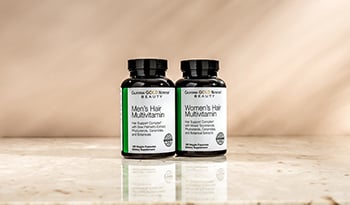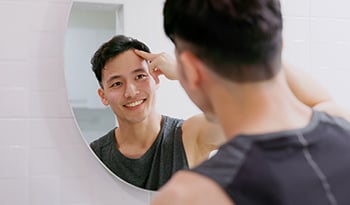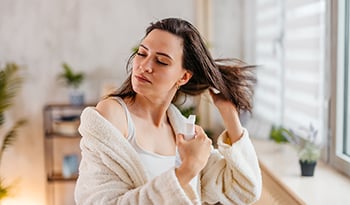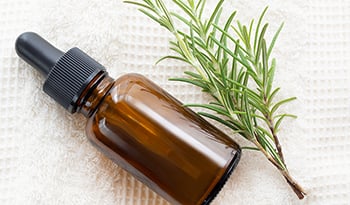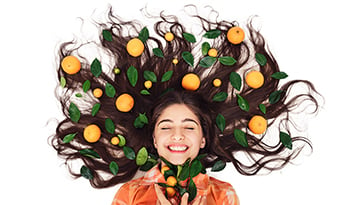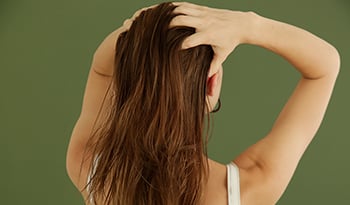The Best Vitamins and Supplements for Healthy Hair
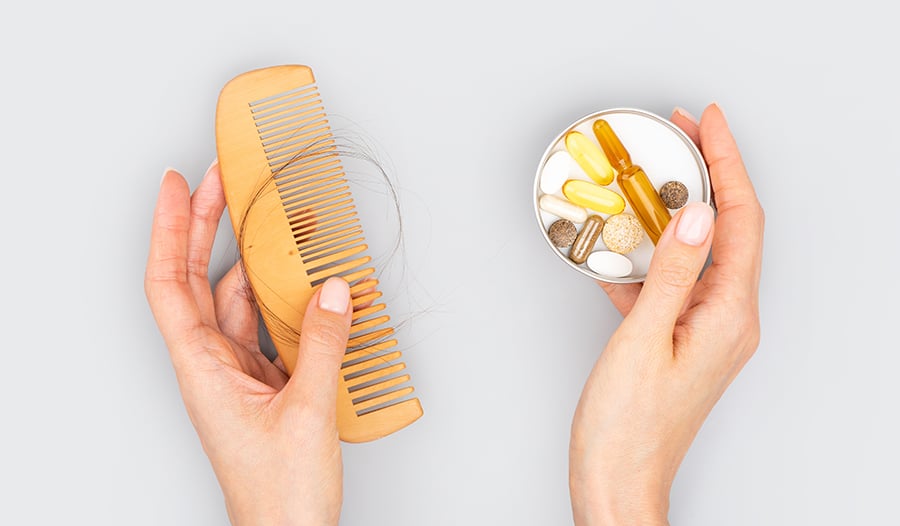
If you're looking for ways to unlock the secrets to healthier, stronger hair, look no further! When it comes to achieving healthy hair, it’s not just about the products you’re putting on your strands—it’s also about what you put in your body. The right vitamins and supplements can help nourish your hair from within, supporting growth, reducing breakage, and promoting thickness.
Nutrients like biotin, vitamin A, vitamin C, iron, and zinc all contribute to the structure and function of your hair follicles and scalp. Whether you’re experiencing thinning or shedding or simply want to give your hair a little extra love, adding hair-supportive nutrients to your routine may help you achieve visible results.
Read on to discover the best vitamins and supplements for healthy hair—and how to incorporate them into your daily wellness plan.
Biotin
If you’ve looked into good vitamins for hair growth in the past, you’ve probably run across biotin, also known as vitamin B7. It’s one of the most well-known vitamins for healthy hair. It plays a key role in the production of keratin, the structural protein that forms the foundation of your hair, skin, and nails.
Biotin is a water-soluble vitamin, so your body doesn’t store it in large amounts. Because of this, it’s important to consume biotin regularly through foods or supplements.
While true biotin deficiencies are rare, low levels may lead to symptoms like hair thinning, brittle nails, and dry skin. Biotin is naturally found in a variety of foods, including organ meats, beans, nuts and seeds, and certain veggies. However, if your diet is limited or you’re simply looking to give your hair extra support, biotin supplements can help fill in the gaps.
You can find biotin as a standalone supplement, in multivitamins, or as part of a targeted hair, skin, and nails blend.
Vitamin A
Vitamin A, found in foods with orange hues like sweet potatoes and carrots, is one of the best vitamins for hair growth and thickness. Research shows proper doses of these retinoids are important for the anagen phase—the active growth phase of hair follicles. Vitamin A also promotes the production of sebum, the natural oil that keeps the scalp hydrated and helps prevent hair from becoming dry and brittle.
While vitamin A is essential, it’s important not to overdo it. Since it is fat-soluble, excess amounts are stored in the body and can accumulate to harmful levels. In fact, too much vitamin A can contribute to hair loss rather than growth.
The recommended dietary allowance (RDA) for vitamin A is 700 micrograms for women and 900 micrograms for men. People who are pregnant or breastfeeding need even more. To stay within healthy limits, always read supplement labels—especially if you’re taking a multivitamin alongside other targeted supplements. Vitamin A is widely available in capsules, gummies, and multivitamin blends, as well as hair, skin, and nail formulas.
Iron
Iron is an essential mineral that’s especially important for healthy hair. It helps red blood cells carry oxygen to your tissues—including the scalp and hair follicles. In fact, low iron levels (especially in women of reproductive age) are among the most common nutritional causes of hair thinning and loss.
Iron is naturally found in a variety of foods. Heme iron, which is more easily absorbed by the body, is found in animal-based foods like red meat, poultry, and seafood. Non-heme iron is found in plant-based foods like lentils, spinach, tofu, and beans.
It’s important to note that when it comes to iron, more isn’t always better. Excess iron can be toxic if your body doesn’t need it. That’s why it's best to speak with your healthcare provider and get your iron levels tested before starting supplementation. If you’ve noticed signs of hair shedding, brittle hair, or breakage, this could indicate that you should get your iron levels checked.
For those with a confirmed deficiency or increased needs, iron supplements are available in capsule, tablet, or liquid forms. Many multivitamins also include modest amounts of iron to help bridge potential dietary gaps.
Zinc
Zinc is often cited for its immunity-supporting benefits, but it may also support healthier hair. Although its exact mechanisms in hair growth aren't fully understood, zinc is essential for a wide range of biological processes, including hormone regulation, enzyme activity, and protein synthesis—all of which influence the condition of your hair and scalp.
In fact, zinc deficiency may contribute to temporary hair loss. In one study, people with hair loss had significantly lower levels of zinc than those without hair loss. While it’s unclear whether supplementing with zinc can reverse or slow hair loss, maintaining adequate zinc and other micronutrient levels may support healthy hair.
Although beef, lamb, and oysters contain the most zinc, those following a plant-based diet can still get zinc from foods like pumpkin seeds, legumes, and nuts. The main challenge is that plant-based sources contain phytates, compounds that inhibit zinc absorption in the body. This means that even if you’re consuming enough zinc from plant-based foods, your body might not be absorbing it efficiently.
If you’re concerned about your zinc status, especially if you follow a plant-based diet, are recovering from illness, or are experiencing hair shedding, supplementation may help fill in the gaps. Zinc is available in a variety of forms, including capsules, lozenges, and liquids. It is also commonly included in immune-support blends.
Vitamin C
You likely already recognize vitamin C as a powerful antioxidant and immune system booster, but its benefits go beyond fighting off colds. Vitamin C also plays a significant role in hair health. One of its key functions is helping your body produce collagen, an essential protein for hair structure.
Plus, vitamin C enhances iron absorption, making it an ideal nutrient to pair with iron-rich foods or supplements. Foods like citrus, bell peppers, and broccoli are excellent sources of vitamin C, but you can further boost your intake by taking vitamin C supplements. Vitamin C is widely available in chewables, powders, capsules, and even drink mixes.
Multivitamins
If you want a convenient way to cover all your nutritional bases, a daily multivitamin is a great start. Many of the best multivitamins for hair contain a full spectrum of vitamins for hair growth and thickness, including biotin, vitamins A, C, and E, zinc, and more.
It’s important to choose a multivitamin that’s tailored to your specific life stage and needs. For example, multivitamins are often specially formulated for age, gender, and life stage (such as prenatal, menopause support, etc.). These personalized blends ensure you get the proper nutrients to support your unique biology.
Multivitamins are available in a variety of forms, including capsules, softgels, gummies, and powders, making it easy to find a format that fits your preferences.
The Bottom Line
Healthy hair starts from within, and the right vitamins and minerals can give your hair the boost it needs. Nutrients like biotin, iron, zinc, vitamin A, and vitamin C are foundational for thicker, stronger hair. While food should always be your first source of nutrition, high-quality supplements can help fill any dietary gaps. Before starting any new supplement, check with your healthcare provider to be sure it is safe for you and won’t interact with other medications you are taking, especially when it comes to nutrients like iron or vitamin A.
References:
- Karashima T, Tsuruta D, Hamada T, et al. Oral zinc therapy for zinc deficiency-related telogen effluvium. Dermatologic Therapy. 2012;25(2):210-213.
- Kil MS, Kim CW, Kim SS. Analysis of serum zinc and copper concentrations in hair loss. Annals of Dermatology. 2013;25(4):405.
- Biotin | NIH Office of Dietary Supplements. Accessed 4/21/2025
- Iron | NIH Office of Dietary Supplements. Accessed 4/21/2025
- Vitamin A and Carotenoids | NIH Office of Dietary Supplements. Accessed 4/21/25
- Pullar JM, Carr AC, Vissers MCM. The Roles of Vitamin C in Skin Health. Nutrients. 2017;9(8):866. Published 2017 Aug 12.
- Ruiz-Tagle SA 1, Figueira MM, Vial V, Espinoza-Benavides L, Miteva M, Our Dermatology Online. Micronutrients in hair loss. Our Dermatol Online. Published online March 1, 2018:320-328.
- Sandstead HH, Freeland-Graves JH. Dietary phytate, zinc and hidden zinc deficiency. J Trace Elem Med Biol. 2014;28(4):414-417.
- Shrivastava SB. Diffuse hair loss in an adult female: approach to diagnosis and management. Indian J Dermatol Venereol Leprol. 2009;75(1):20-28. doi:10.4103/0378-6323.45215
- VanBuren CA, Everts HB. Vitamin A in Skin and Hair: An Update. Nutrients. 2022;14(14):2952. Published 2022 Jul 19. doi:10.3390/nu14142952
DISCLAIMER:This Wellness Hub does not intend to provide diagnosis...















































































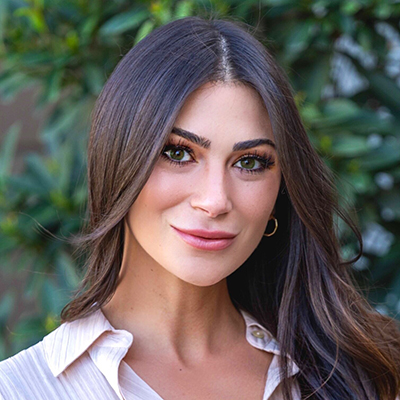
 Table of Contents
Table of Contents




